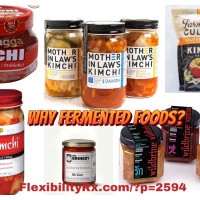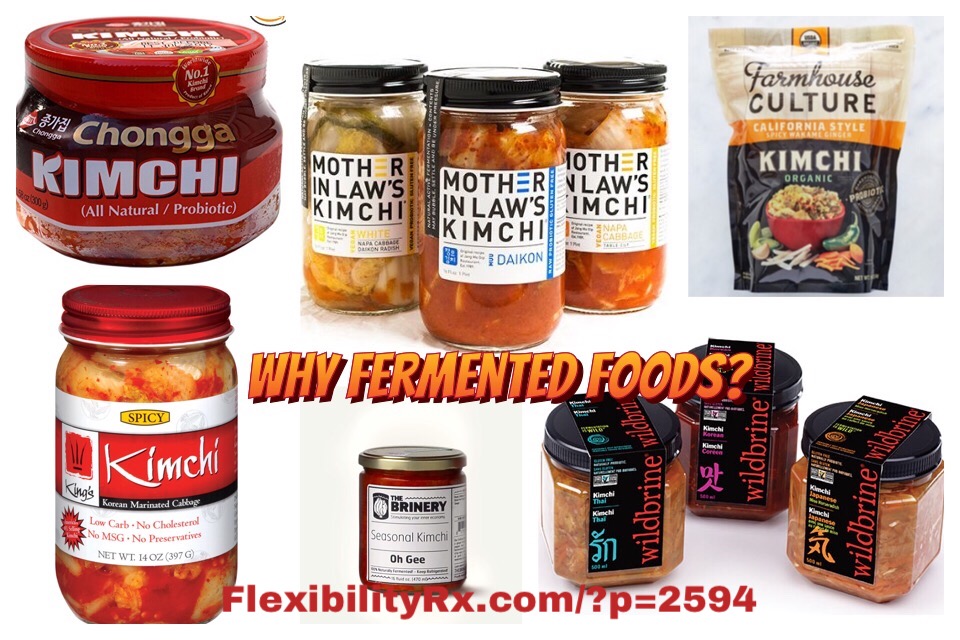
Wednesday: Nutrition (Benefits of Fermented Kimchi)
https://www.flexibilityrx.com/?p=2594
Kimchi is just one type of fermented food that can be incorporated into one’s diet (my personal favorite). While at-home fermentation is the best route (I will save this for a future post), there are some good store-bought options for fermented foods. These are six options that I enjoy but availability will depend on where you live.
Beneficial bacteria are just one benefit of fermented foods, other benefits include enhanced bioavailability of minerals and greater nutritional content of foods via amino acids and enzymes. It is important to realize however that a lot of store bought Kimchi or sauerkraut is NOT fermented.
Look for a label that says, “Contains live cultures” or “Naturally fermented” to ensure that particular kimchi was not pasteurized. Pasteurization is what kills the live probiotic bacteria – the increase of pasteurized foods over the years is the very reason that we are starting to see more fermented foods available.
Catherine Shanahan MD in her book, “Deep Nutrition: Why Your Genes Need Traditional Food” explains that the traditional cuisine around the world that has been removed from the typical diet (aka healthy diet) is based on four pillars of Deep Nutrition.
“Though each local interpretation appears unique, as far as your body’s cells are concerned, healthy diets are all essentially the same, resting on the same Four Pillars: meat on the bone, fermented and sprouted foods, organs and other nasty bits, and fresh, unadulterated plant and animal products (unpasteurized/homogenized/raw when appropriate).”
In regard to fermented/sprouted foods she states that vegetarians in particular will benefit from these two potent methodologies for enhancing nutrition.
Why Fermentation?
“Both fermented and fiber rich foods help optimize gut flora by supporting beneficial bacteria. Fermentation also enriches the nutritional content of food producing essential amino acids, short-chained fatty acids, beneficial enzymes, certain nutrients and increases bioavailability of minerals.” – Dr. Mercola
Resources on the Microbiome
If you want to read a great article on the microbiome I recommend Scientific American’s article, “Your Inner Ecosystem.” Another good article pertaining to the psychological implications of gut health (that mirrors the gut/brain connection talked about in the books, “Gut and Pscyhology Syndrome” and “The Second Brain”) is the Psychology Today magazine article, “Is Kimchi the New Prozac.?”
Benefits of Fermented Foods
Enhanced nutritional content via fermentation
Increased bioavailability of minerals
Supply beneficial enzymes
Contains wider variety of beneficial bacteria than probiotic
Repairs leaky gut = improved mental function
Destroy unhealthy yeast
Organic acid production for digestive PH and regulation of acidity levels
Immune system function: increased antibodies to destroy pathogens
Good chelators (detoxify by binding to toxins/heavy metals)
Helps eliminate inflammatory bowel conditions
Positively affects gene expression (epigenetics)
Weight loss: reduce inflammatory trigger of obesity
Here is just a brief summary from Dr. Mercola:
“Indeed, some have suggested your body can best be viewed as a “super organism” composed of a diverse array of symbiotic microorganisms that need to be kept in proper balance for optimal physical and psychological functioning. You have approximately 1,000 different species of bacteria living in your body, and these bacteria actually outnumber your body’s cells by 10 to 1. You also harbor viruses (bacteriophages), and they in turn outnumber bacteria 10 to 1. They’ve even realized your microbiome is one of the environmental factors that drive genetic expression, turning genes on and off depending on which microbes are present.”
Different Brands/Styles of Kimchi
In terms of store bought kimchi – traditionally you will find napa cabbage as the base along with green onion, garlic, ginger, and red pepper. “Mother In Law’s” kimchi brand also makes a daikon radish kimchi (as opposed to cabbage) that is commonly served in Korean restaurants alongside traditional kimchi. Fermented kimchi’s may or may not include salted seafood (jeotgal) such as salted shrimp or anchovies. I would recommend first trying some kimchi without the salted seafood.
The “Wildbrine” brand provides three varieties of kimchi: a Japanese, Thai, and Korean version. This Korean version has some sea vegetables in it that I really enjoy but that others may find overwhelming.
The Thai style kimchi is very similar to the “California style” kimchi of the “Farmhouse Culture” brand. This is not a traditional kimchi flavor but may be a good entry point for some. The ingredients here are: napa cabbage, walter, salt, daikon radish, carrots, leeks, ginger, garlic, paprika, date sugar, wakame, cayenne, bird’s eye chili.
The Japanese style kimchi from Wildbrine contains the following ingredients: Umami miso, tangy daikon, and earthy hot horseradish unite with bright citrus and ginger in a Japanese inspired vegan and gluten-free kimchi.
Ironically much traditional Korean kimchi in stores is not traditionally prepared (fermented AND not pasteurized), whereas much of the newer fermented kimchi options include flavors that are not very traditionally Korean.
Kimchi in Korea
“Kimchi is a traditional dish in Korea. Historical records indicate that this food was prepared and eaten as early as 57BC. In ancient times kimchi was always fermented in order to preserve the food for the long cold winters when fresh vegetables were not available. Today kimchi continues to be an important part of the diet in both North and South Korea. Many Koreans eat this dish with every meal and for many a meal is only considered complete if it includes Kimchi. These vegetable ferments are also used as ingredients in many traditional Korean recipes including kimchi stew. Until relatively recently kimchi was always homemade. It was fermented over long periods at home in clay pots. Many people still make their own kimchi.” – Probiotics Help
Resources
https://articles.mercola.com/sites/articles/archive/2011/07/16/this-food-helps-you-to-detox-pesticides.aspx
https://milkimchi.com/apps/find-us
https://www.farmhouseculture.com/kraut
Chongga Kimchi: https://www.amazon.com/gp/product/B06XBMVZ75/
https://thebrinery.com
https://fabferments.com/ff-store-locations/
http://www.probiotics-help.com/korean-kimchi.html
https://articles.mercola.com/sites/articles/archive/2016/07/18/health-benefits-fermented-foods.aspx

Leave A Reply (No comments so far)
You must be logged in to post a comment.
No comments yet